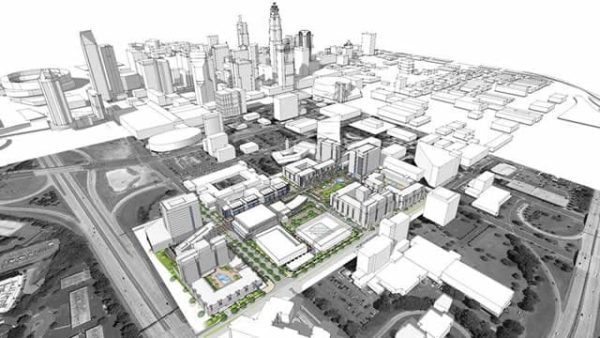Alumnus’s project reimagines historic Brooklyn neighborhood

Although Lindsey McAlpine (‘90) was pursuing a double major in business and psychology at UNC Charlotte, he always knew real estate development would play an outsized role in his professional future.
“I was actively working in real estate and anxious to go out in the business world,” he recalled. “I started my first development company between my junior and senior year in college.”
Fast forward a quarter-century and the former UNC Charlotte alumni president has made his mark in the development world. Yet, McAlpine feels his biggest and most personal project is just around the corner. As the managing partner of Citisculpt, an urban mixed-use developer working exclusively in the Carolinas, McAlpine is now one of three developers vying to revive and redevelop the Second Ward community once known as Brooklyn. The Mecklenburg County Board of Commissioners will make the selection.
 “This is the most impactful project in Charlotte in my generation,” said the Charlotte native. “It’s an opportunity to rebuild a historic legacy and to build nearly the whole quadrant of the Second Ward.”
“This is the most impactful project in Charlotte in my generation,” said the Charlotte native. “It’s an opportunity to rebuild a historic legacy and to build nearly the whole quadrant of the Second Ward.”
Second Ward currently is dominated by the city’s government quarter, the courthouse, the no-longer used Board of Education offices and the rarely-used Marshall Park. Fifty years ago, the area was home to about 1,000 African-American families. The community was razed as part of the kind of urban renewal plans that swept through the country during the 1960s and ’70s. Residents, who had no say in the matter, were supposed to be relocated to federally funded public housing that never materialized. The families, largely left to their own devices to find housing, were dispersed to the city’s poorer neighborhoods surrounding the city center. The treatment left deep scars with those who lost their homes, neighborhood and community.
In large part, the kind of urban renewal projects that displaced urban, minority communities and wiped out a city’s character and history have largely been discredited. Now, development and gentrification tend to focus on, if not preserving the past, at least giving a nod to it. Redeveloping the Second Ward is no doubt a tricky project since it contains so many moving parts, including reimagining Marshall Park.
McAlpine has worked to keep all these elements in mind throughout every step of his design process. The group researched the area’s history and the stories of people who had lived there in order to understand the best way create a positive and inclusive legacy. He believes CitiSculpt’s community outreach sets it apart from the other two competitors. “We are absolutely committed to hearing what all the stakeholders want in this design, and it’s extremely important to hear the community’s input about this design.”
CitiSculpt has put together a team with the kind of unique experience necessary to bring its vision — up to 1,378 residential units along with hotels, retail space and offices — to fruition. Prominent architect and former mayor Harvey Gantt essentially came out of retirement to lend his insight and vision to this project.
“There’s a lot of pain associated with the removal of that community,” says Gantt. “That is why this development has to be done well and realized. It sends a serious message to the African-American community that we wanted so badly to restore the community that we chose the right company to deliver the completion of this project.”
If McAlpine is selected, he will be very, very busy for the nex four to five years. That’s how long he estimates creating the new Brooklyn will take.
Melba Newsome is a freelance writer who lives in Charlotte; she frequently contributes to the UNC Charlotte magazine.
Image: A CitiSculpt rendering for the planned redevelopment project in Second Ward.